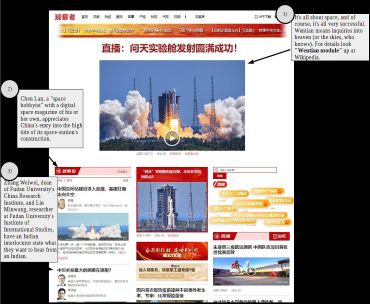America announced on Wednesday that the United States Pacific Command will be renamed Indo-Pacific Command.
This is a plan that has been taking shape for a long time, but has given the common people a running gag when discussing America‘s Asian strategy. Washington now welcomes this attention.
美国星期三宣布将太平洋司令部改名为印度洋-太平洋司令部,这是早已透出的计划,但还是提供了世人谈论美国亚洲战略的一个噱头。华盛顿现在很欢迎这样的关注。
Apart from analyzing how much symbolic or practical significance this kind of renaming may have, many media follow American guidance, looking at it as Washington‘s emphasis on uniting with India, as one of the steps aimed at exerting more pressure on China.
除了分析这种改名有多少象征意义和多少实际意义,很多媒体顺着美方的引导,将这看成华盛顿重视并联合印度,向中国施加更大压力的步骤之一。
This is, of course, an important momentary American strategic consideration. However, we believe that Washington is looking at the next, bigger game. The Indo-Pacific strategy has two long-term objectives. One is to make China and India, the world‘s two largest emerging countries with a population of more than a billion, neutralize each other strategically. The second is to respond to and to plan ahead for the inevitable rise of India, and to make American control of the Indian
Ocean happen in time, thus keeping India from becoming a new challenge.
这当然是美国当下的重要战略考量。不过我们认为,华盛顿在下一盘更大的棋。印太战略有两个长远目标:一是要促成中印这两个世界上十亿人口以上新兴大国的长期相互战略消耗;二是为应对必将到来的印度崛起未雨绸缪,将美国加强对印度洋的控制提前变成现实,防止印度成为新的挑战。
China‘s rise is nothing isolated, but heralds the rise of the Asian continent. When history will look back at the 21rst century, the Sino-Indian rise will most probably be seen as two consecutive waves in the same major event. The nature of China‘s and India‘s rise is identical, with two underdeveloped countries moving to the front of global development, thus driving fairer rules for global economics and politics, and allowing people who have long found themselves trailing
behind to enjoy the benefits of modernization.
中国崛起不是孤立的,而是亚洲大陆崛起的先声。历史回望21世纪时,中印崛起很有可能被看成一个大事件的先后波次。中印崛起的本质都是一样的,那就是后发国家走向世界发展的前台,促使世界的经济和政治规则更加公平,让长期处在落后、贫困中的人们分享现代化的红利。
No matter if it is about China‘s or India‘s development, Westerners‘ true feelings are complicated. In the current stage, Western public opinion more supportive attitude towards Indian development at this stage comes from strategic thought that restrains taking advantage now. As India will continuously earn economic successes, Western public opinion‘s dislike of Indian development will surface in the end.
无论对中国发展,还是对印度发展,西方人的真实情感都很复杂。现阶段西方舆论对印度发展给予了更多支持,是地缘政治思维压住了利益计算的临时心态。随着印度不断获得经济成功,西方舆论对印度发展的反感终将浮上水面。
India‘s diplomacy may be sailing with tailwinds in the smoothest seas, but this won‘t last very long. If India‘s development turns out to be rather smooth, relations with the West will become highly complicated.
现在是印度外交最顺风顺水的时候,但这个时间不会很长。如果印度的发展比较顺利,或许20年后它与西方的关系就将高度复杂化。
For America, helping India and controlling China and promoting the mutual strategic neutralization of the two, is its best countermeasure to deal with Asia. Agitation for the Indo-Pacific strategy and American containment of China are two thoughts that raised their heads at about the same time. They are two aspects of almost the same strategic consideration. It can even be said that Washington and its main Asia-Pacific allies are working diligently and tirelessly at this. Also, this dream of theirs was almost put into reality at the Doklam standoff in summer 2017.
对美国来说,拉印制华,促使中印相互战略消耗,是其最佳的亚洲对策。鼓吹印太战略与美国遏制中国思维的抬头差不多同时发生,它们几乎是同一战略考量的不同侧面。华盛顿及其主要亚太盟友可谓对此孜孜以求,而且它们的这一愿望在2017年夏天的洞朗危机期间几乎就要实现了。
The Indian Ocean is increasingly turning into global navigation‘s center of gravity, but this area‘s structure of military strength is simple nevertheless. In future, more forces will enter this area, but provided that China and India maintain normal relations, the outstanding competition will probably not be Sino-Indian. America will inevitably play the leading role here, and also go to any length to act as the director, excluding any side that would share in the power.
印度洋越来越成为全球海上交通的重心,但该地区的军事力量格局则相对简单。未来会有更多力量介入该地区,但是只要中印保持正常关系,印度洋上最为突出的安全竞争就不太可能是中印之间的,美国必将是那场竞争的第一主角,而且它将竭尽全力充当主导者,排斥任何一方与它分享权力。
China has no military bases in the Indian Ocean, Indian public opinion is alerted by China‘s participation in building harbors in Sri Lanka and Pakistan. However, the Indian Ocean‘s only significance for China is in passage, while to America, it is a new front in consolidating its global hegemony. A far-sighted view can see the main contradictions on the Indian Ocean inevitably occurring between America and India.
中国在印度洋没有军事基地,印度舆论目前对中国在斯里兰卡、巴基斯坦参与港口建设充满警惕。然而印度洋对于中国的唯一意义是通道,但它是美国巩固全球霸权的新的主阵地。往远了看印度洋上的主要矛盾必将在美国和印度之间发生。
The importance of America‘s military base on Diego Garcia will continuously become more obvious. That base doesn‘t make China feel threatened in any way, but it will probably soon cause India increasing unease.
美国在印度洋上迪戈加西亚军事基地的要性将不断凸显出来,那个基地并不让中国感到什么威胁,但是印度方面大概很快就会对那个基地地位的提升而感到不安。
The Asian continent is facing two different prospects. One is that China and India will be successfully split by America, clash with each other, constitute restrictions on one another, neutralize each other, thus delaying their respective rise to different degrees. The second is that the two countries successfully resolve their disputes or set them aside, jointly promote an irreversible global trend of rising new emerging markets, which allows human society‘s development to obtain a fairer distribution, with Asia as a whole gradually entering modernization.
亚洲大陆面临两种前景:一是中印被美国成功分化,相互冲突,形成彼此牵制、消耗之势,双方的崛起都不同程度地延后;二是两国成功化解或搁置纠纷,共同推动新兴市场的崛起成为不可逆转的世界大势,使人类社会的发展权利得到更加公平的分配,亚洲作为一个整体逐渐步入现代化。
The Indo-Pacific strategy is a big pit, dug by America. Washington wants to bury both China‘s and India‘s rise in there. The anticipation of some American elites is to help India to push China into the pit and India helping to fill it, just to kick India into the next pit.
印太战略是美国挖的一个很大的坑,华盛顿想在这一个坑里同时埋葬中国崛起和印度崛起。一些美国精英的如意算盘是,先拉着印度一起把中国推到坑里,印度跟着填土,然后再把印度也踹进坑里。
Of course, this is the anticipation some Americans are dreaming of. From India‘s reactions to the Indo-Pacific strategy so far, it can easily be seen that there is an awareness in New Delhi that India will, in the end, earn very little from this strategy.
当然了,这是一些美国人梦一般的如意算盘。从印度迄今对印太战略的反应中不难看出,新德里是存了一个心眼的,印度最终被美国这一战略俘获的可能性很小。




[…] temporary, too, just as they are at Argentine Radio and TV, and disputes over journalistic content don’t appear to…